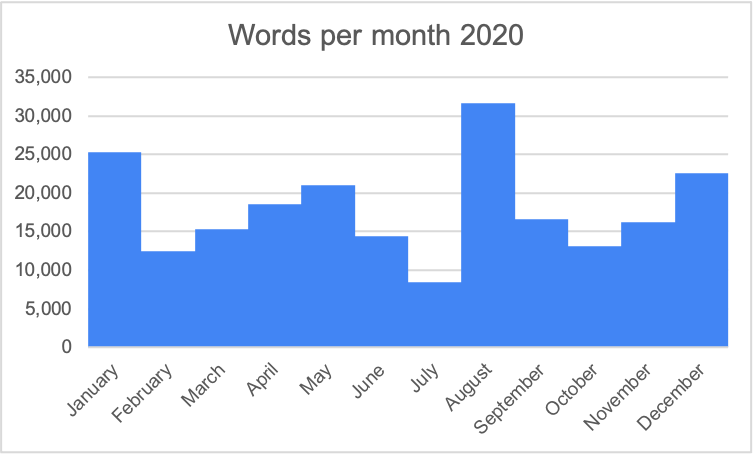How to break free when you can’t seem to move.
 Part of a series on writing every day.
Part of a series on writing every day.
- Part 1: Let’s call 2020 a practice year
- Part 2: Where just 200 words a day can get you
- Part 3: Why I wrote every day for over a year
- Part 4: How I wrote every day
- Part 5: How I conquered the block (this post)
I’ve heard you all, during the last few blog posts. “But Mark,” you cry, “it’s all well and good for you, saying 200 words takes ten to twenty minutes. But I can sit there forever waiting for inspiration, and nothing happens.”
Trust me, I’ve been there. And not just before I started the habit of writing every day. Even right in the middle of it, I got seriously stuck.
Remember this graph from the ‘Why’ post a few days back ?

January is the usual ’new year, new me’ spike you always get - it’s new, you’re notivated, every day is exciting. February is the usual ‘oh wait, you really mean every day?’ drop. From March to May were great months, gradually stretching the writing to get more and more words in a day, even as lockdown started and the world started to make a lot less sense.
In fact, I think I was using my writing as a way to silence the noise of 2020 at that point. I could control what went on the page, in a way I couldn’t control a lot else in my life. But at the time I hadn’t realised that this was not something that could last forever.
June was my partner’s 40th Birthday. We’d planned a big event since the year before - booked a hotel, arranged a cake, band, everything. Not to mention a big meal out at a fabulous Michelin-starred restaurant. And naturally had to make a decision relatively early in 2020 whether to cancel it all or just ‘wait and see’ where the world was in June. We decided to cancel in late March.
But actually getting to the day itself, having a tiny 2-person party was quite fun. We knew there was no alternative, so we threw ourselves into it and made the most of it. It hadn’t been what we planned, but we decided not to sulk about what might have been.
But as you no doubt know yourselves, deciding not to let it get to you doesn’t actually stop it getting to you. We both went into a bit of a lull, without that big event to look forward to, and more uncertainty clouding the rest of the year.
I kept writing every day. But not as many words. May averaged 700 a day, June 480. July netted me 274 a day.
So yeah, things got hard. But a few things kept me going - and tracking my wordcounts helped me see this.
I had a habit
By the time I hit the lull in June, the habit was already very well ingrained. I’d also set up the streak counter that you can see on the home page of this site , and I didn’t want any gaps in it.
By the 1st June I’d written for 152 days straight. It was harder to stop than I expected. Each day I’d feel a nagging thought that I ‘should really just get some words out’, and when I sat down to do it, the routine and the sense memories kicked in to help me.
I was doing well
272 words a day was a drop from my peak, and even a drop from my average, but it was still more than the target. If you overperformed by 36% consistently you’d be a superstar in your field, so even the drop-off I was experiencing could be described as ‘good output’.
I’d already written 92,562 words by the 1st June. Even if I didn’t write anything else all year I could be proud of that. But I figured that even with decreased motivation I might be able to double it… and I wanted to know if that was possible.
2020 was awful
I had to give myself a break for not doing as well as I might have hoped. 2020 was an incredibly stressful and frankly unprecedented year. A global pandemic, hugely contested election, wildfires, monoliths and who knows what else slipepd through the cracks. And all of it instantly reported, speculated about and panicked over in a buzzing device you carry everywhere you go.
Honestly, if you survived 2020 you deserve a medal. Doing anything reliably, or consistently is all but impossible under those conditions. Only the habit I’d formed kept me going, but it did keep me going.
This too shall pass
Nothing lasts forever. I reminded myself that one day this lull would be over, that time would continue to flow whatever I did. Where did I want to be at the end of the week, the month, the year? Did I want to be someone who had written every day, or someone who wished they had? It was a clear, achievable goal that I had control over. Exercising that control helped me.
Change modes
When all else failed, if I sat down to write and all of the above didn’t work, I just wrote something else. It might have been an outline for an idea I’d been nursing. It might have been worldbuilding for a new series I have in mind. (Side-note, how fun is worldbuilding?) Exploring a new world and explaining it to myself was a few thousand words of my output at the low point, and revitalised my desire to write. I could take that energy and excitement, and bring it back to the main work in progress.
Maybe you need to switch to editing something, or write non-fiction for a while (such as a blog post). Or free-write, just blurt out everything that occurs to you on a topic. Try writing with pen and paper if you usually type, or vice-versa. Give dictation a try - it’s pretty good on phones and computers now, even without additional software.
Look after yourself
Self-care counts. Even just showering and putting on clean clothes can change your mood. Going for a walk, or taking a breath of air outside can be hugely reviving. Treat yourself as a reward for completing your writing - whether that’s a chocolate truffle, a glass of wine or an episode of ‘Tiger King’.
And if none of this works? If you still can’t write 200 words a day? Well, I believe you can. But if you can’t, don’t let yourself give up. Try again tomorrow. Sit there, force yourself to look at the blank page. Sooner or later your brain will say ‘oh for crying out loud, here, write this’ and you’re off to the races.

